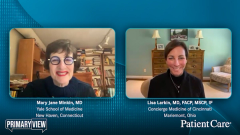
VMS Treatment Guidelines
Panelists discuss key considerations for women taking hormonal therapy, emphasizing the importance of individualized treatment plans and shared decision-making to evaluate the risk-benefit profile of therapy.
Episodes in this series

Episode 6
The following transcript has been edited for clarity, style, and length.
Mary Jane Minkin, MD: I’d like to start by saying that Lisa and I are longtime friends, and we’ve had many conversations about this. We’re both strong proponents of estrogen therapy. So, let me be clear: we are not abandoning estrogen for these new medications, even though they are fabulous. The NK3 and NK1 receptor antagonists are groundbreaking, both in their biochemistry and their clinical results.
That said, these drugs are primarily for women who can’t or won’t take estrogen. They offer a fantastic option, particularly for patients who don’t tolerate estrogen or for whom it’s contraindicated. For example, in my oncology clinic, I see many breast cancer survivors devastated by vasomotor symptoms and sleep disturbances. These medications can be life-changing for them.
Lisa, as the immediate past president of the Menopause Society, can you talk about the society’s updated guidelines on hormonal and non-hormonal therapies? I’d also encourage our viewers to visit the Menopause Society’s website,
Lisa Larkin, MD: Absolutely. I strongly encourage everyone to read these guidelines, as they represent the gold standard for managing menopause.
As Dr Minkin said, we’ve both been shaped by the evolution of menopausal hormone therapy (MHT) over our careers. Unfortunately, many primary care clinicians, particularly those who entered the field after the 2002 Women’s Health Initiative (WHI) data, were taught to avoid hormone therapy entirely. For over two decades, there’s been a lack of education and a pervasive fear of hormones, stemming from concerns about stroke, heart attack, breast cancer, and dementia listed on package labels.
I recently saw a patient whose primary care doctor told her they ran a “hormone-free practice.” This highlights how misunderstood hormone therapy still is. However, today in 2024, we’ve gained a far better understanding of who benefits from hormone therapy, its advantages, and its risks.
Here’s what the current guidelines emphasize: for symptomatic women close to the menopause transition, MHT should be the first-line treatment. It’s highly effective for vasomotor symptoms, sleep issues, and more. Yet, fewer than 5% of appropriate candidates are even offered hormone therapy. That’s a huge disservice to these women.
Now, we do have exciting new non-hormonal drugs, but they’re primarily for women who can’t or won’t take hormones. While drugs like elinzanetant show promise for vasomotor symptoms and sleep, we don’t yet know their effects on other critical outcomes like cardiovascular risk, bone health, sexual function, or cognitive health. These areas remain unanswered.
So, for the majority of women, MHT remains the gold standard for managing menopausal symptoms. The guidelines make that clear.
Minkin: I agree, and to expand on Lisa’s point, there are other menopausal symptoms that estrogen helps with, even if they’re not part of the official indications. Let’s recap the primary indications for MHT: moderate to severe vasomotor symptoms, vaginal dryness, osteoporosis protection, and, for women with premature ovarian failure, comprehensive hormone replacement.
But estrogen benefits go beyond these. For example, many women report relief from joint aches and other discomforts. Vaginal dryness, bladder symptoms, and other aspects of genitourinary syndrome of menopause (GSM) are also areas where estrogen excels. These new drugs, while effective for hot flashes and sleep, don’t address GSM, bladder health, joint pain, or improvements in skin and hair.
So, while these medications are valuable, they don’t replace estrogen’s broader benefits. It’s about finding the right balance for each patient.
One final thought: menopause care takes time. These are complex conversations that require careful discussion with patients. You may not get rich as a menopause specialist, but you’ll make a real difference in your patients’ lives. And that’s what matters most.
Newsletter
Enhance your clinical practice with the Patient Care newsletter, offering the latest evidence-based guidelines, diagnostic insights, and treatment strategies for primary care physicians.




























































































































